Mental Health Practice Standards Application and Analysis Report
VerifiedAdded on 2022/12/29
|20
|5353
|3
Report
AI Summary
This report delves into the application of the Australian Association of Social Workers (AASW) Practice Standards for Mental Health Social Workers, examining eight key components and three core values, including ethics. It presents clinical scenarios illustrating the application of these standards, utilizing Focused Psychological Strategies (FPS) and the SBAR structure for assessment. The report covers values and ethics, professionalism, culturally responsive practice, knowledge application, and professional development. Each standard is addressed with a practice issue, FPS application, and a detailed explanation. The report aims to demonstrate an understanding of the standards through practical examples and personal experiences, emphasizing the importance of recovery-oriented practice, cultural sensitivity, and effective clinical strategies. The report also showcases the application of various FPS techniques such as psycho-education, CBT, relaxation strategies, and interpersonal therapy to address various mental health challenges.
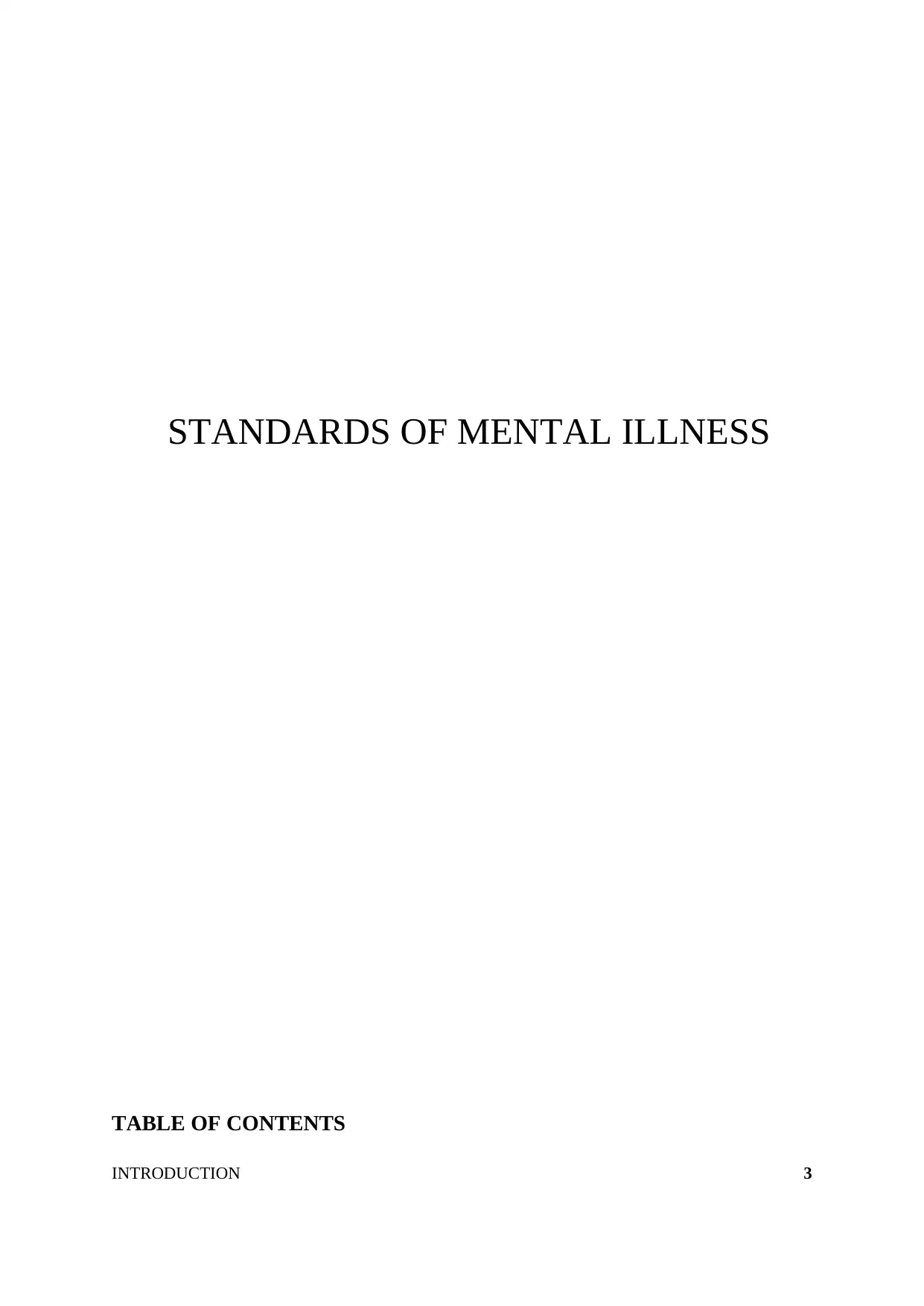
STANDARDS OF MENTAL ILLNESS
TABLE OF CONTENTS
INTRODUCTION 3
TABLE OF CONTENTS
INTRODUCTION 3
Paraphrase This Document
Need a fresh take? Get an instant paraphrase of this document with our AI Paraphraser
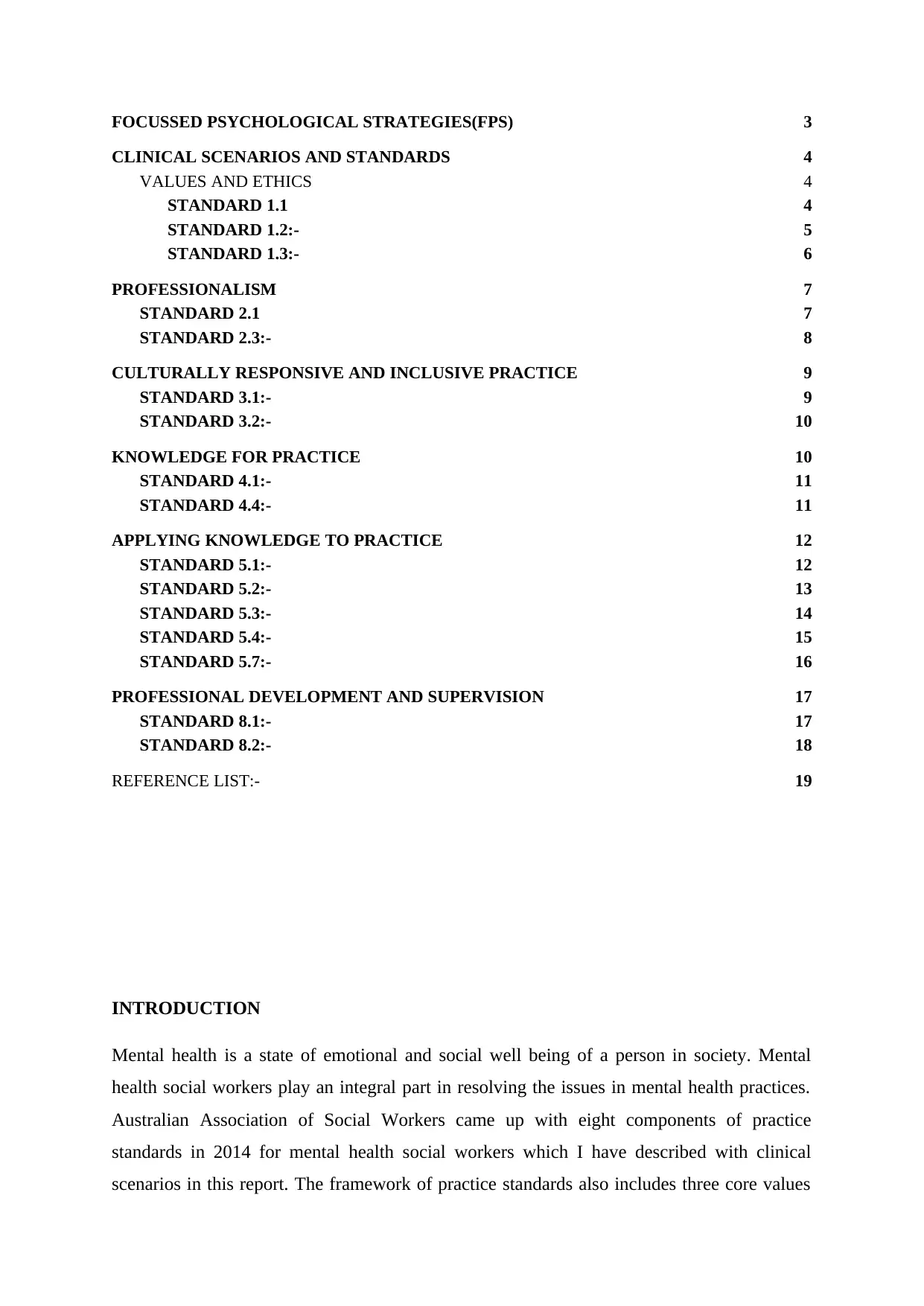
FOCUSSED PSYCHOLOGICAL STRATEGIES(FPS) 3
CLINICAL SCENARIOS AND STANDARDS 4
VALUES AND ETHICS 4
STANDARD 1.1 4
STANDARD 1.2:- 5
STANDARD 1.3:- 6
PROFESSIONALISM 7
STANDARD 2.1 7
STANDARD 2.3:- 8
CULTURALLY RESPONSIVE AND INCLUSIVE PRACTICE 9
STANDARD 3.1:- 9
STANDARD 3.2:- 10
KNOWLEDGE FOR PRACTICE 10
STANDARD 4.1:- 11
STANDARD 4.4:- 11
APPLYING KNOWLEDGE TO PRACTICE 12
STANDARD 5.1:- 12
STANDARD 5.2:- 13
STANDARD 5.3:- 14
STANDARD 5.4:- 15
STANDARD 5.7:- 16
PROFESSIONAL DEVELOPMENT AND SUPERVISION 17
STANDARD 8.1:- 17
STANDARD 8.2:- 18
REFERENCE LIST:- 19
INTRODUCTION
Mental health is a state of emotional and social well being of a person in society. Mental
health social workers play an integral part in resolving the issues in mental health practices.
Australian Association of Social Workers came up with eight components of practice
standards in 2014 for mental health social workers which I have described with clinical
scenarios in this report. The framework of practice standards also includes three core values
CLINICAL SCENARIOS AND STANDARDS 4
VALUES AND ETHICS 4
STANDARD 1.1 4
STANDARD 1.2:- 5
STANDARD 1.3:- 6
PROFESSIONALISM 7
STANDARD 2.1 7
STANDARD 2.3:- 8
CULTURALLY RESPONSIVE AND INCLUSIVE PRACTICE 9
STANDARD 3.1:- 9
STANDARD 3.2:- 10
KNOWLEDGE FOR PRACTICE 10
STANDARD 4.1:- 11
STANDARD 4.4:- 11
APPLYING KNOWLEDGE TO PRACTICE 12
STANDARD 5.1:- 12
STANDARD 5.2:- 13
STANDARD 5.3:- 14
STANDARD 5.4:- 15
STANDARD 5.7:- 16
PROFESSIONAL DEVELOPMENT AND SUPERVISION 17
STANDARD 8.1:- 17
STANDARD 8.2:- 18
REFERENCE LIST:- 19
INTRODUCTION
Mental health is a state of emotional and social well being of a person in society. Mental
health social workers play an integral part in resolving the issues in mental health practices.
Australian Association of Social Workers came up with eight components of practice
standards in 2014 for mental health social workers which I have described with clinical
scenarios in this report. The framework of practice standards also includes three core values
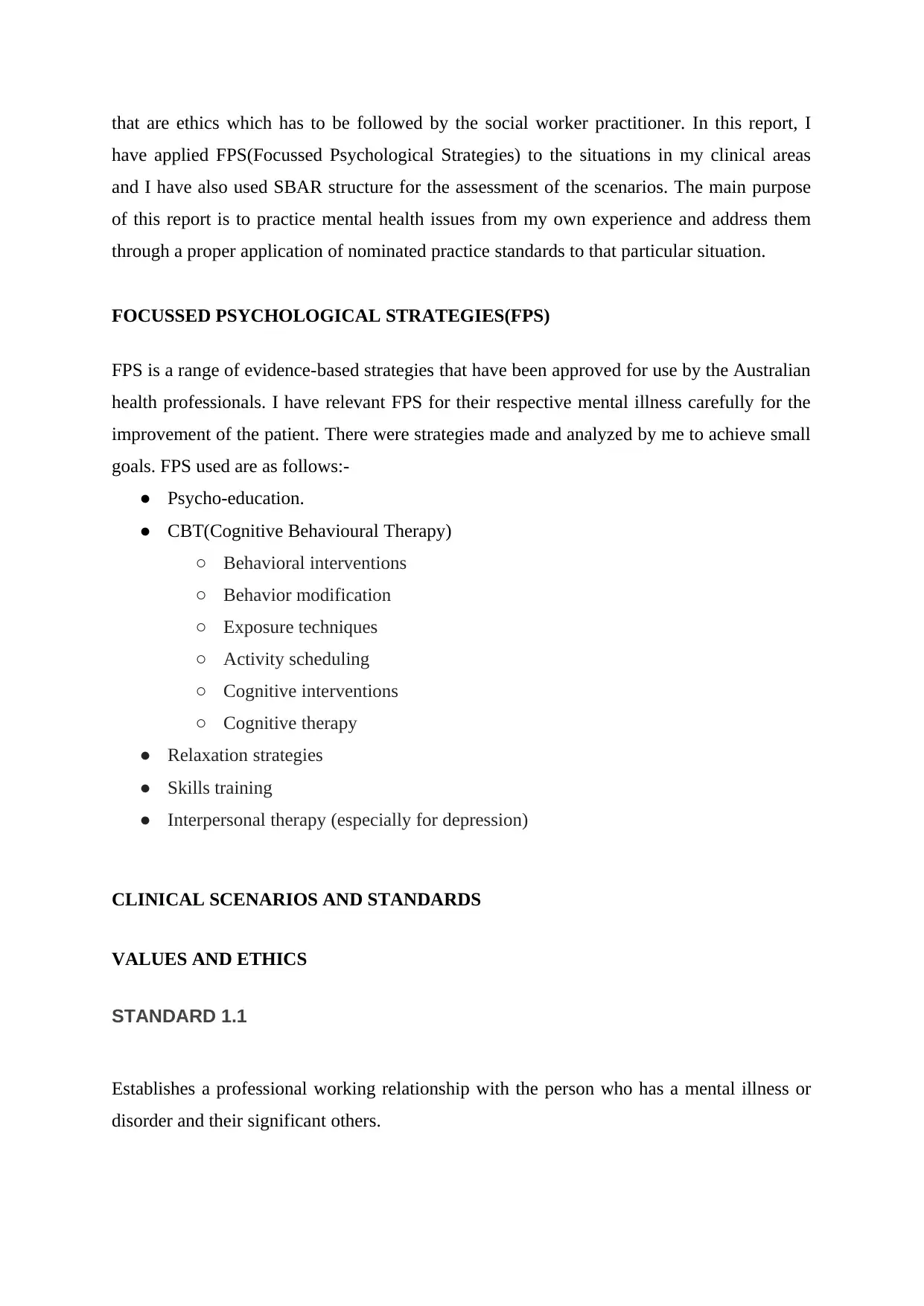
that are ethics which has to be followed by the social worker practitioner. In this report, I
have applied FPS(Focussed Psychological Strategies) to the situations in my clinical areas
and I have also used SBAR structure for the assessment of the scenarios. The main purpose
of this report is to practice mental health issues from my own experience and address them
through a proper application of nominated practice standards to that particular situation.
FOCUSSED PSYCHOLOGICAL STRATEGIES(FPS)
FPS is a range of evidence-based strategies that have been approved for use by the Australian
health professionals. I have relevant FPS for their respective mental illness carefully for the
improvement of the patient. There were strategies made and analyzed by me to achieve small
goals. FPS used are as follows:-
● Psycho-education.
● CBT(Cognitive Behavioural Therapy)
○ Behavioral interventions
○ Behavior modification
○ Exposure techniques
○ Activity scheduling
○ Cognitive interventions
○ Cognitive therapy
● Relaxation strategies
● Skills training
● Interpersonal therapy (especially for depression)
CLINICAL SCENARIOS AND STANDARDS
VALUES AND ETHICS
STANDARD 1.1
Establishes a professional working relationship with the person who has a mental illness or
disorder and their significant others.
have applied FPS(Focussed Psychological Strategies) to the situations in my clinical areas
and I have also used SBAR structure for the assessment of the scenarios. The main purpose
of this report is to practice mental health issues from my own experience and address them
through a proper application of nominated practice standards to that particular situation.
FOCUSSED PSYCHOLOGICAL STRATEGIES(FPS)
FPS is a range of evidence-based strategies that have been approved for use by the Australian
health professionals. I have relevant FPS for their respective mental illness carefully for the
improvement of the patient. There were strategies made and analyzed by me to achieve small
goals. FPS used are as follows:-
● Psycho-education.
● CBT(Cognitive Behavioural Therapy)
○ Behavioral interventions
○ Behavior modification
○ Exposure techniques
○ Activity scheduling
○ Cognitive interventions
○ Cognitive therapy
● Relaxation strategies
● Skills training
● Interpersonal therapy (especially for depression)
CLINICAL SCENARIOS AND STANDARDS
VALUES AND ETHICS
STANDARD 1.1
Establishes a professional working relationship with the person who has a mental illness or
disorder and their significant others.
⊘ This is a preview!⊘
Do you want full access?
Subscribe today to unlock all pages.

Trusted by 1+ million students worldwide
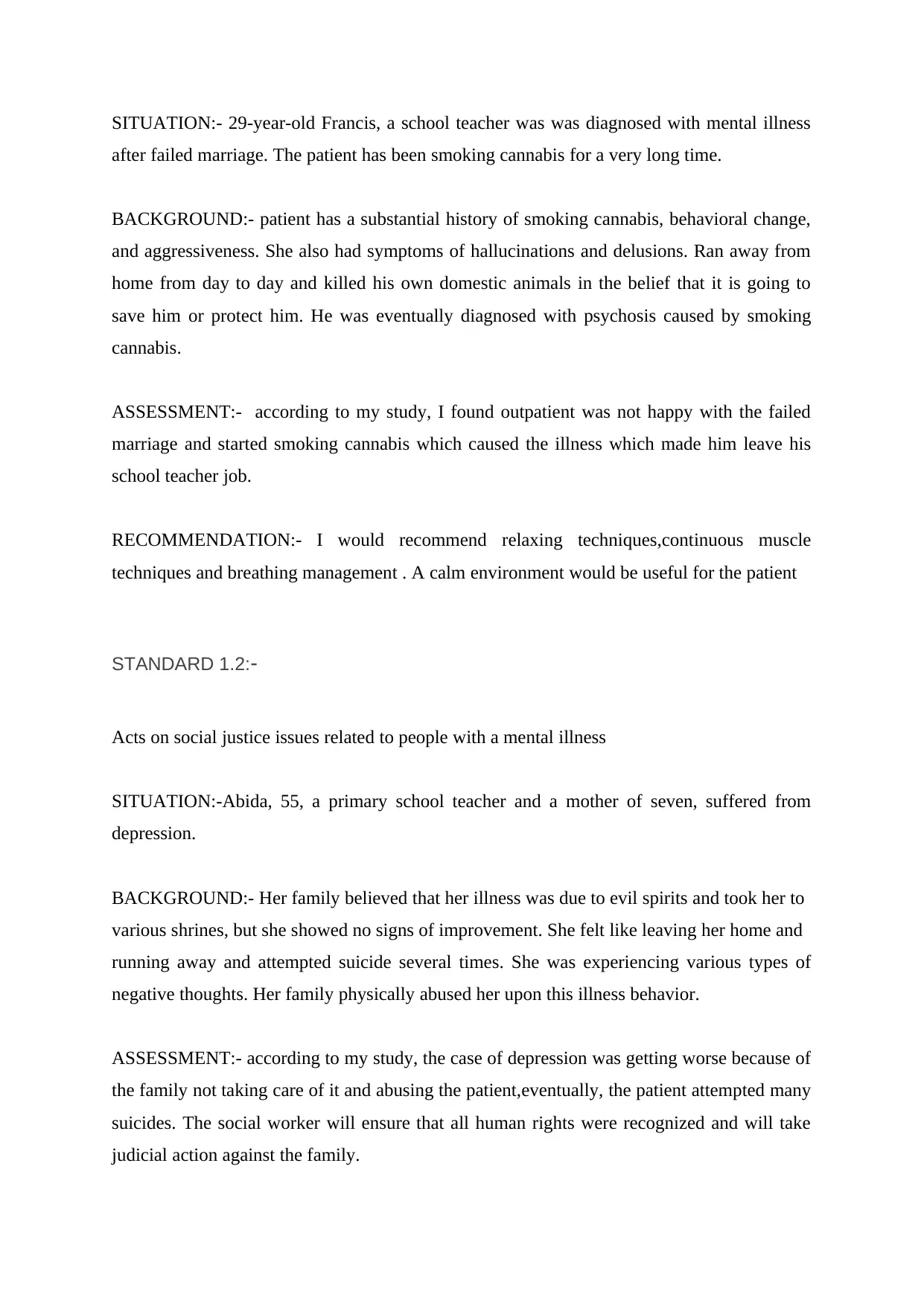
SITUATION:- 29-year-old Francis, a school teacher was was diagnosed with mental illness
after failed marriage. The patient has been smoking cannabis for a very long time.
BACKGROUND:- patient has a substantial history of smoking cannabis, behavioral change,
and aggressiveness. She also had symptoms of hallucinations and delusions. Ran away from
home from day to day and killed his own domestic animals in the belief that it is going to
save him or protect him. He was eventually diagnosed with psychosis caused by smoking
cannabis.
ASSESSMENT:- according to my study, I found outpatient was not happy with the failed
marriage and started smoking cannabis which caused the illness which made him leave his
school teacher job.
RECOMMENDATION:- I would recommend relaxing techniques,continuous muscle
techniques and breathing management . A calm environment would be useful for the patient
STANDARD 1.2:-
Acts on social justice issues related to people with a mental illness
SITUATION:-Abida, 55, a primary school teacher and a mother of seven, suffered from
depression.
BACKGROUND:- Her family believed that her illness was due to evil spirits and took her to
various shrines, but she showed no signs of improvement. She felt like leaving her home and
running away and attempted suicide several times. She was experiencing various types of
negative thoughts. Her family physically abused her upon this illness behavior.
ASSESSMENT:- according to my study, the case of depression was getting worse because of
the family not taking care of it and abusing the patient,eventually, the patient attempted many
suicides. The social worker will ensure that all human rights were recognized and will take
judicial action against the family.
after failed marriage. The patient has been smoking cannabis for a very long time.
BACKGROUND:- patient has a substantial history of smoking cannabis, behavioral change,
and aggressiveness. She also had symptoms of hallucinations and delusions. Ran away from
home from day to day and killed his own domestic animals in the belief that it is going to
save him or protect him. He was eventually diagnosed with psychosis caused by smoking
cannabis.
ASSESSMENT:- according to my study, I found outpatient was not happy with the failed
marriage and started smoking cannabis which caused the illness which made him leave his
school teacher job.
RECOMMENDATION:- I would recommend relaxing techniques,continuous muscle
techniques and breathing management . A calm environment would be useful for the patient
STANDARD 1.2:-
Acts on social justice issues related to people with a mental illness
SITUATION:-Abida, 55, a primary school teacher and a mother of seven, suffered from
depression.
BACKGROUND:- Her family believed that her illness was due to evil spirits and took her to
various shrines, but she showed no signs of improvement. She felt like leaving her home and
running away and attempted suicide several times. She was experiencing various types of
negative thoughts. Her family physically abused her upon this illness behavior.
ASSESSMENT:- according to my study, the case of depression was getting worse because of
the family not taking care of it and abusing the patient,eventually, the patient attempted many
suicides. The social worker will ensure that all human rights were recognized and will take
judicial action against the family.
Paraphrase This Document
Need a fresh take? Get an instant paraphrase of this document with our AI Paraphraser
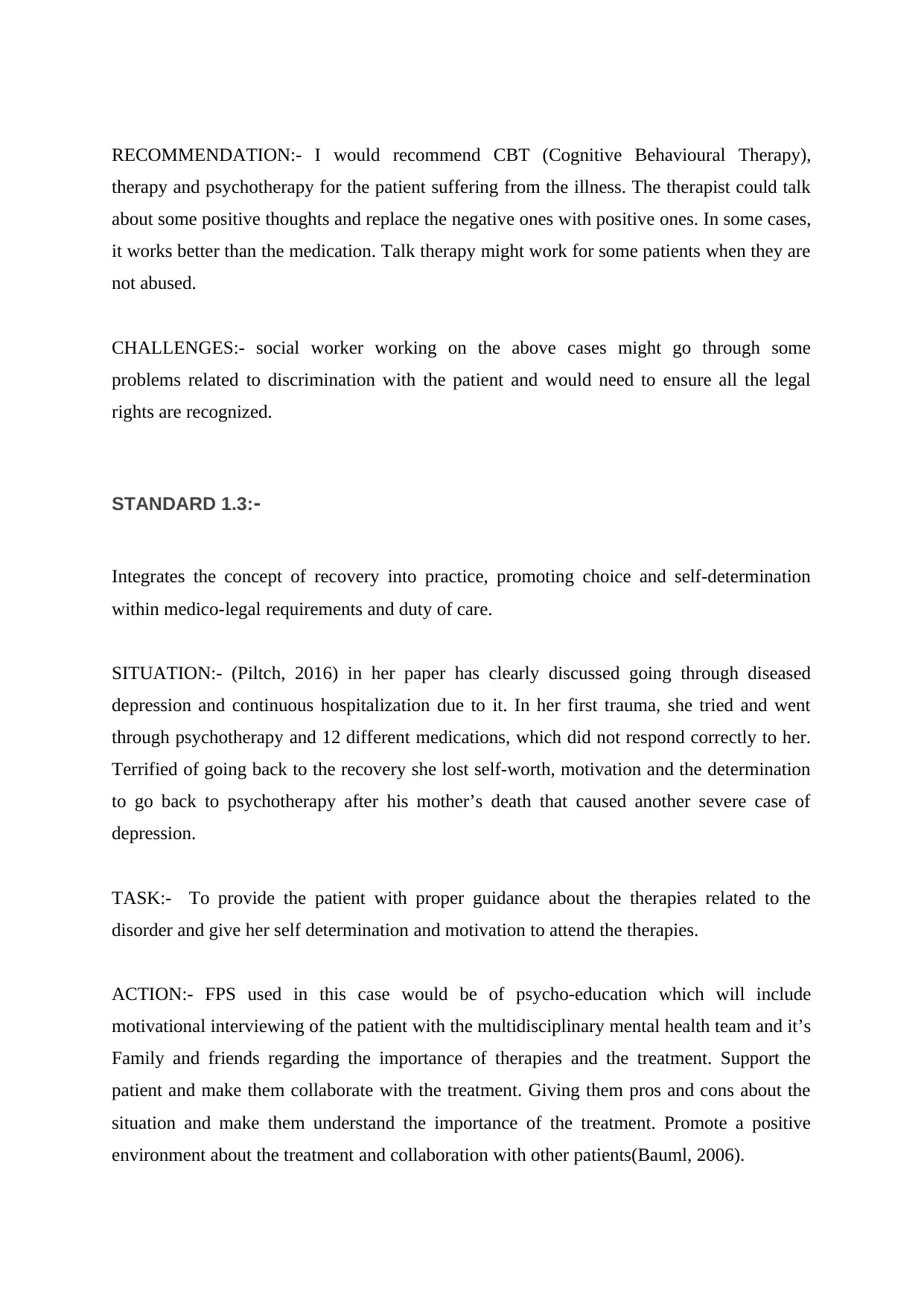
RECOMMENDATION:- I would recommend CBT (Cognitive Behavioural Therapy),
therapy and psychotherapy for the patient suffering from the illness. The therapist could talk
about some positive thoughts and replace the negative ones with positive ones. In some cases,
it works better than the medication. Talk therapy might work for some patients when they are
not abused.
CHALLENGES:- social worker working on the above cases might go through some
problems related to discrimination with the patient and would need to ensure all the legal
rights are recognized.
STANDARD 1.3:-
Integrates the concept of recovery into practice, promoting choice and self-determination
within medico-legal requirements and duty of care.
SITUATION:- (Piltch, 2016) in her paper has clearly discussed going through diseased
depression and continuous hospitalization due to it. In her first trauma, she tried and went
through psychotherapy and 12 different medications, which did not respond correctly to her.
Terrified of going back to the recovery she lost self-worth, motivation and the determination
to go back to psychotherapy after his mother’s death that caused another severe case of
depression.
TASK:- To provide the patient with proper guidance about the therapies related to the
disorder and give her self determination and motivation to attend the therapies.
ACTION:- FPS used in this case would be of psycho-education which will include
motivational interviewing of the patient with the multidisciplinary mental health team and it’s
Family and friends regarding the importance of therapies and the treatment. Support the
patient and make them collaborate with the treatment. Giving them pros and cons about the
situation and make them understand the importance of the treatment. Promote a positive
environment about the treatment and collaboration with other patients(Bauml, 2006).
therapy and psychotherapy for the patient suffering from the illness. The therapist could talk
about some positive thoughts and replace the negative ones with positive ones. In some cases,
it works better than the medication. Talk therapy might work for some patients when they are
not abused.
CHALLENGES:- social worker working on the above cases might go through some
problems related to discrimination with the patient and would need to ensure all the legal
rights are recognized.
STANDARD 1.3:-
Integrates the concept of recovery into practice, promoting choice and self-determination
within medico-legal requirements and duty of care.
SITUATION:- (Piltch, 2016) in her paper has clearly discussed going through diseased
depression and continuous hospitalization due to it. In her first trauma, she tried and went
through psychotherapy and 12 different medications, which did not respond correctly to her.
Terrified of going back to the recovery she lost self-worth, motivation and the determination
to go back to psychotherapy after his mother’s death that caused another severe case of
depression.
TASK:- To provide the patient with proper guidance about the therapies related to the
disorder and give her self determination and motivation to attend the therapies.
ACTION:- FPS used in this case would be of psycho-education which will include
motivational interviewing of the patient with the multidisciplinary mental health team and it’s
Family and friends regarding the importance of therapies and the treatment. Support the
patient and make them collaborate with the treatment. Giving them pros and cons about the
situation and make them understand the importance of the treatment. Promote a positive
environment about the treatment and collaboration with other patients(Bauml, 2006).
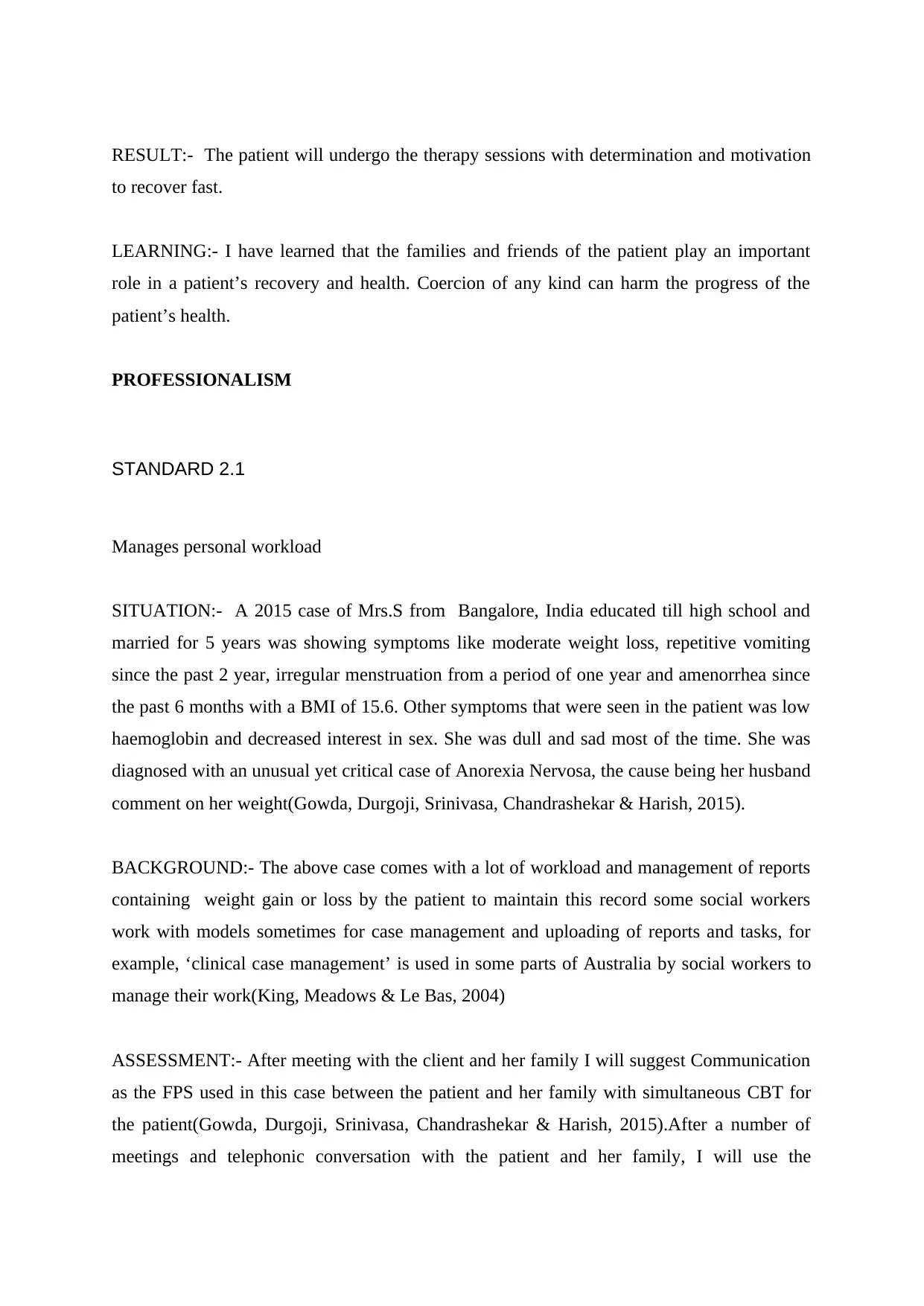
RESULT:- The patient will undergo the therapy sessions with determination and motivation
to recover fast.
LEARNING:- I have learned that the families and friends of the patient play an important
role in a patient’s recovery and health. Coercion of any kind can harm the progress of the
patient’s health.
PROFESSIONALISM
STANDARD 2.1
Manages personal workload
SITUATION:- A 2015 case of Mrs.S from Bangalore, India educated till high school and
married for 5 years was showing symptoms like moderate weight loss, repetitive vomiting
since the past 2 year, irregular menstruation from a period of one year and amenorrhea since
the past 6 months with a BMI of 15.6. Other symptoms that were seen in the patient was low
haemoglobin and decreased interest in sex. She was dull and sad most of the time. She was
diagnosed with an unusual yet critical case of Anorexia Nervosa, the cause being her husband
comment on her weight(Gowda, Durgoji, Srinivasa, Chandrashekar & Harish, 2015).
BACKGROUND:- The above case comes with a lot of workload and management of reports
containing weight gain or loss by the patient to maintain this record some social workers
work with models sometimes for case management and uploading of reports and tasks, for
example, ‘clinical case management’ is used in some parts of Australia by social workers to
manage their work(King, Meadows & Le Bas, 2004)
ASSESSMENT:- After meeting with the client and her family I will suggest Communication
as the FPS used in this case between the patient and her family with simultaneous CBT for
the patient(Gowda, Durgoji, Srinivasa, Chandrashekar & Harish, 2015).After a number of
meetings and telephonic conversation with the patient and her family, I will use the
to recover fast.
LEARNING:- I have learned that the families and friends of the patient play an important
role in a patient’s recovery and health. Coercion of any kind can harm the progress of the
patient’s health.
PROFESSIONALISM
STANDARD 2.1
Manages personal workload
SITUATION:- A 2015 case of Mrs.S from Bangalore, India educated till high school and
married for 5 years was showing symptoms like moderate weight loss, repetitive vomiting
since the past 2 year, irregular menstruation from a period of one year and amenorrhea since
the past 6 months with a BMI of 15.6. Other symptoms that were seen in the patient was low
haemoglobin and decreased interest in sex. She was dull and sad most of the time. She was
diagnosed with an unusual yet critical case of Anorexia Nervosa, the cause being her husband
comment on her weight(Gowda, Durgoji, Srinivasa, Chandrashekar & Harish, 2015).
BACKGROUND:- The above case comes with a lot of workload and management of reports
containing weight gain or loss by the patient to maintain this record some social workers
work with models sometimes for case management and uploading of reports and tasks, for
example, ‘clinical case management’ is used in some parts of Australia by social workers to
manage their work(King, Meadows & Le Bas, 2004)
ASSESSMENT:- After meeting with the client and her family I will suggest Communication
as the FPS used in this case between the patient and her family with simultaneous CBT for
the patient(Gowda, Durgoji, Srinivasa, Chandrashekar & Harish, 2015).After a number of
meetings and telephonic conversation with the patient and her family, I will use the
⊘ This is a preview!⊘
Do you want full access?
Subscribe today to unlock all pages.

Trusted by 1+ million students worldwide
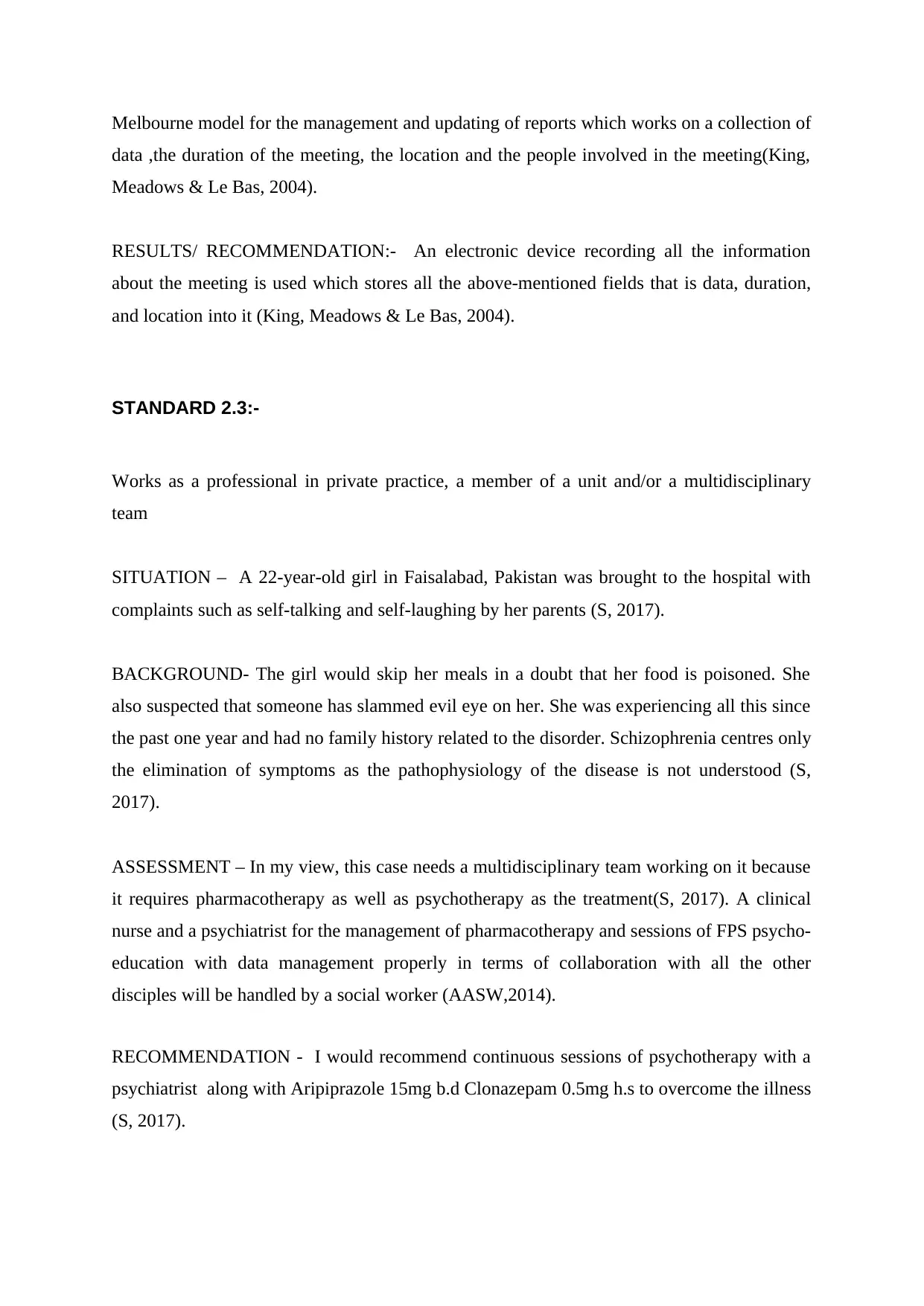
Melbourne model for the management and updating of reports which works on a collection of
data ,the duration of the meeting, the location and the people involved in the meeting(King,
Meadows & Le Bas, 2004).
RESULTS/ RECOMMENDATION:- An electronic device recording all the information
about the meeting is used which stores all the above-mentioned fields that is data, duration,
and location into it (King, Meadows & Le Bas, 2004).
STANDARD 2.3:-
Works as a professional in private practice, a member of a unit and/or a multidisciplinary
team
SITUATION – A 22-year-old girl in Faisalabad, Pakistan was brought to the hospital with
complaints such as self-talking and self-laughing by her parents (S, 2017).
BACKGROUND- The girl would skip her meals in a doubt that her food is poisoned. She
also suspected that someone has slammed evil eye on her. She was experiencing all this since
the past one year and had no family history related to the disorder. Schizophrenia centres only
the elimination of symptoms as the pathophysiology of the disease is not understood (S,
2017).
ASSESSMENT – In my view, this case needs a multidisciplinary team working on it because
it requires pharmacotherapy as well as psychotherapy as the treatment(S, 2017). A clinical
nurse and a psychiatrist for the management of pharmacotherapy and sessions of FPS psycho-
education with data management properly in terms of collaboration with all the other
disciples will be handled by a social worker (AASW,2014).
RECOMMENDATION - I would recommend continuous sessions of psychotherapy with a
psychiatrist along with Aripiprazole 15mg b.d Clonazepam 0.5mg h.s to overcome the illness
(S, 2017).
data ,the duration of the meeting, the location and the people involved in the meeting(King,
Meadows & Le Bas, 2004).
RESULTS/ RECOMMENDATION:- An electronic device recording all the information
about the meeting is used which stores all the above-mentioned fields that is data, duration,
and location into it (King, Meadows & Le Bas, 2004).
STANDARD 2.3:-
Works as a professional in private practice, a member of a unit and/or a multidisciplinary
team
SITUATION – A 22-year-old girl in Faisalabad, Pakistan was brought to the hospital with
complaints such as self-talking and self-laughing by her parents (S, 2017).
BACKGROUND- The girl would skip her meals in a doubt that her food is poisoned. She
also suspected that someone has slammed evil eye on her. She was experiencing all this since
the past one year and had no family history related to the disorder. Schizophrenia centres only
the elimination of symptoms as the pathophysiology of the disease is not understood (S,
2017).
ASSESSMENT – In my view, this case needs a multidisciplinary team working on it because
it requires pharmacotherapy as well as psychotherapy as the treatment(S, 2017). A clinical
nurse and a psychiatrist for the management of pharmacotherapy and sessions of FPS psycho-
education with data management properly in terms of collaboration with all the other
disciples will be handled by a social worker (AASW,2014).
RECOMMENDATION - I would recommend continuous sessions of psychotherapy with a
psychiatrist along with Aripiprazole 15mg b.d Clonazepam 0.5mg h.s to overcome the illness
(S, 2017).
Paraphrase This Document
Need a fresh take? Get an instant paraphrase of this document with our AI Paraphraser
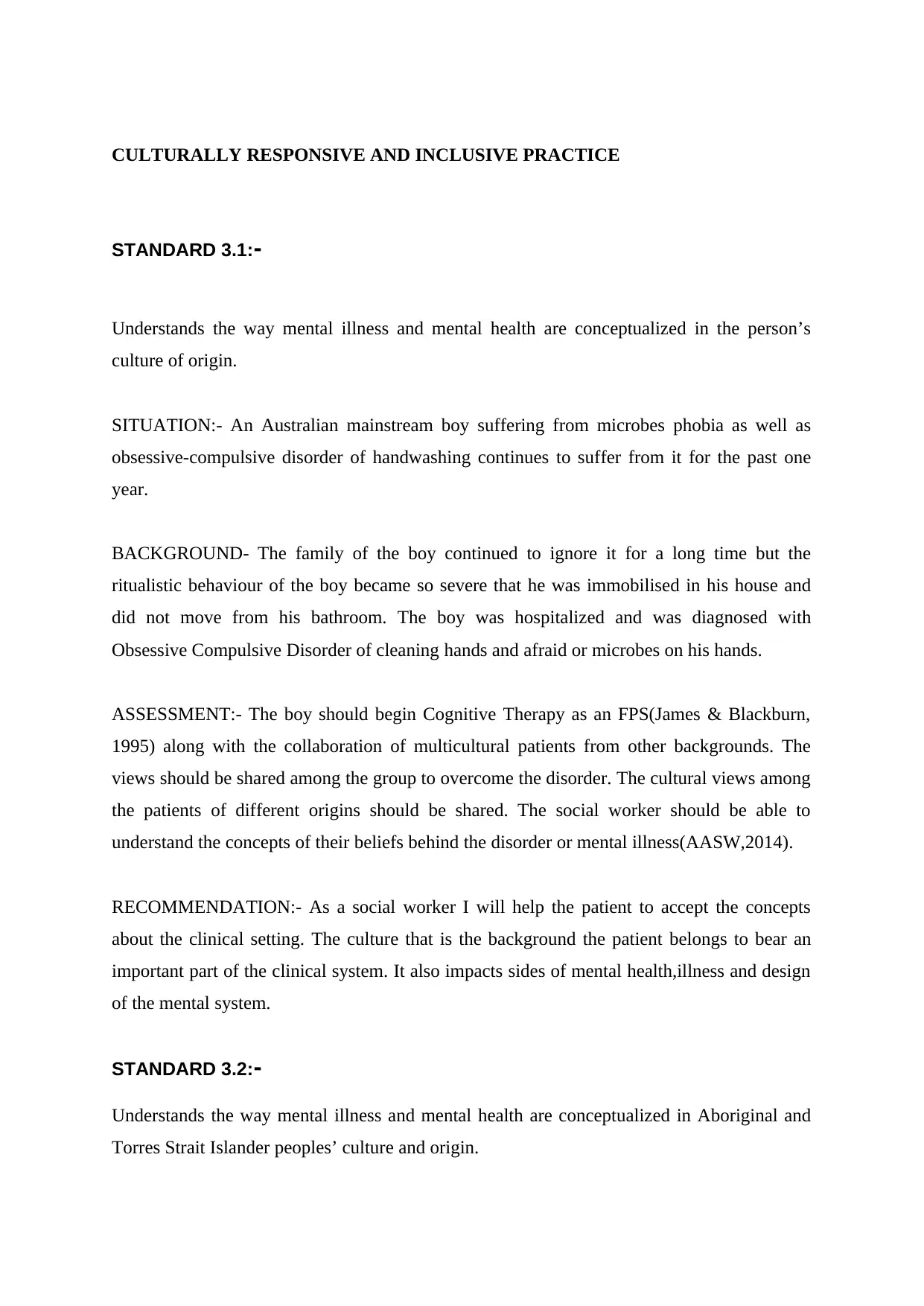
CULTURALLY RESPONSIVE AND INCLUSIVE PRACTICE
STANDARD 3.1:-
Understands the way mental illness and mental health are conceptualized in the person’s
culture of origin.
SITUATION:- An Australian mainstream boy suffering from microbes phobia as well as
obsessive-compulsive disorder of handwashing continues to suffer from it for the past one
year.
BACKGROUND- The family of the boy continued to ignore it for a long time but the
ritualistic behaviour of the boy became so severe that he was immobilised in his house and
did not move from his bathroom. The boy was hospitalized and was diagnosed with
Obsessive Compulsive Disorder of cleaning hands and afraid or microbes on his hands.
ASSESSMENT:- The boy should begin Cognitive Therapy as an FPS(James & Blackburn,
1995) along with the collaboration of multicultural patients from other backgrounds. The
views should be shared among the group to overcome the disorder. The cultural views among
the patients of different origins should be shared. The social worker should be able to
understand the concepts of their beliefs behind the disorder or mental illness(AASW,2014).
RECOMMENDATION:- As a social worker I will help the patient to accept the concepts
about the clinical setting. The culture that is the background the patient belongs to bear an
important part of the clinical system. It also impacts sides of mental health,illness and design
of the mental system.
STANDARD 3.2:-
Understands the way mental illness and mental health are conceptualized in Aboriginal and
Torres Strait Islander peoples’ culture and origin.
STANDARD 3.1:-
Understands the way mental illness and mental health are conceptualized in the person’s
culture of origin.
SITUATION:- An Australian mainstream boy suffering from microbes phobia as well as
obsessive-compulsive disorder of handwashing continues to suffer from it for the past one
year.
BACKGROUND- The family of the boy continued to ignore it for a long time but the
ritualistic behaviour of the boy became so severe that he was immobilised in his house and
did not move from his bathroom. The boy was hospitalized and was diagnosed with
Obsessive Compulsive Disorder of cleaning hands and afraid or microbes on his hands.
ASSESSMENT:- The boy should begin Cognitive Therapy as an FPS(James & Blackburn,
1995) along with the collaboration of multicultural patients from other backgrounds. The
views should be shared among the group to overcome the disorder. The cultural views among
the patients of different origins should be shared. The social worker should be able to
understand the concepts of their beliefs behind the disorder or mental illness(AASW,2014).
RECOMMENDATION:- As a social worker I will help the patient to accept the concepts
about the clinical setting. The culture that is the background the patient belongs to bear an
important part of the clinical system. It also impacts sides of mental health,illness and design
of the mental system.
STANDARD 3.2:-
Understands the way mental illness and mental health are conceptualized in Aboriginal and
Torres Strait Islander peoples’ culture and origin.
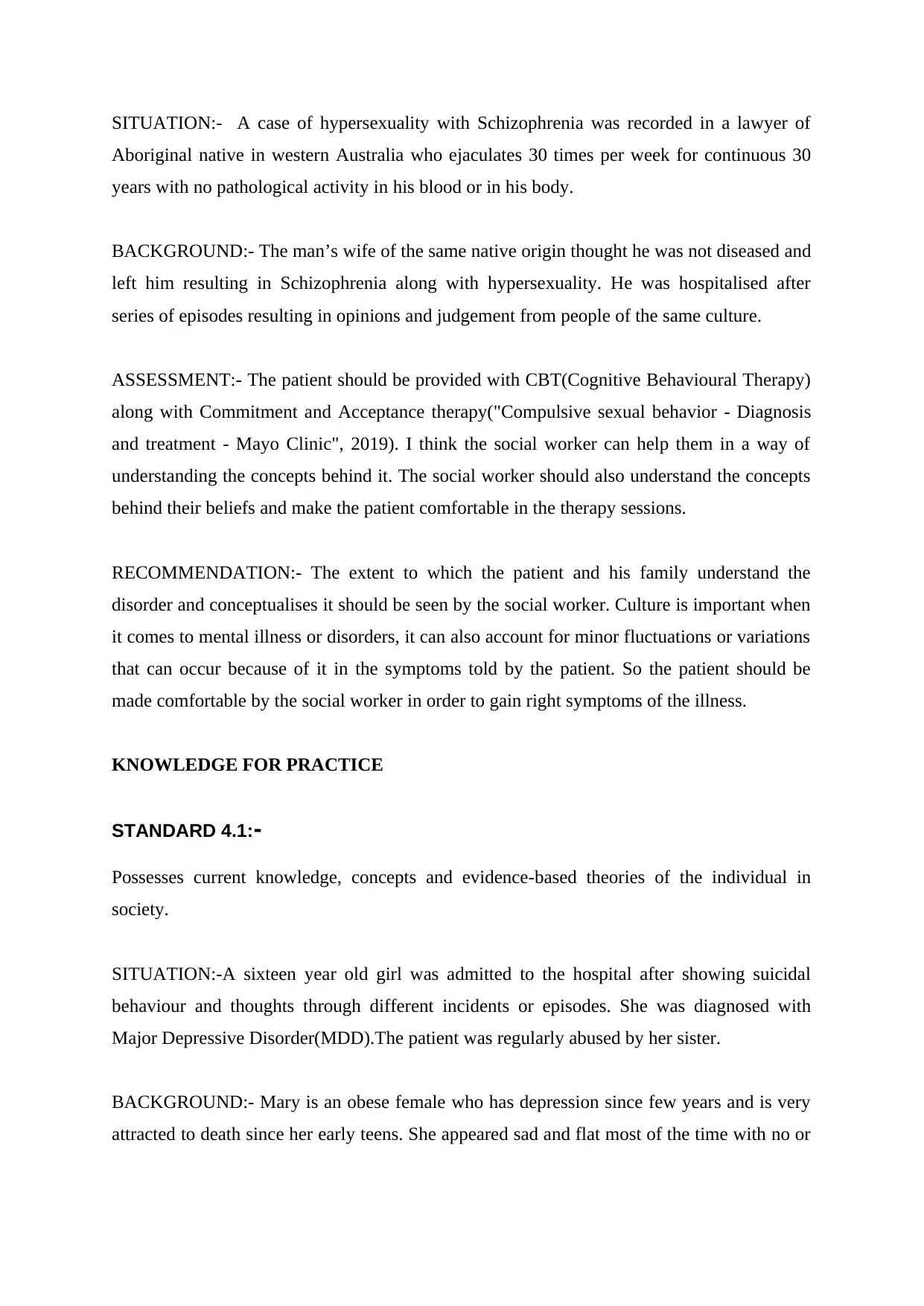
SITUATION:- A case of hypersexuality with Schizophrenia was recorded in a lawyer of
Aboriginal native in western Australia who ejaculates 30 times per week for continuous 30
years with no pathological activity in his blood or in his body.
BACKGROUND:- The man’s wife of the same native origin thought he was not diseased and
left him resulting in Schizophrenia along with hypersexuality. He was hospitalised after
series of episodes resulting in opinions and judgement from people of the same culture.
ASSESSMENT:- The patient should be provided with CBT(Cognitive Behavioural Therapy)
along with Commitment and Acceptance therapy("Compulsive sexual behavior - Diagnosis
and treatment - Mayo Clinic", 2019). I think the social worker can help them in a way of
understanding the concepts behind it. The social worker should also understand the concepts
behind their beliefs and make the patient comfortable in the therapy sessions.
RECOMMENDATION:- The extent to which the patient and his family understand the
disorder and conceptualises it should be seen by the social worker. Culture is important when
it comes to mental illness or disorders, it can also account for minor fluctuations or variations
that can occur because of it in the symptoms told by the patient. So the patient should be
made comfortable by the social worker in order to gain right symptoms of the illness.
KNOWLEDGE FOR PRACTICE
STANDARD 4.1:-
Possesses current knowledge, concepts and evidence-based theories of the individual in
society.
SITUATION:-A sixteen year old girl was admitted to the hospital after showing suicidal
behaviour and thoughts through different incidents or episodes. She was diagnosed with
Major Depressive Disorder(MDD).The patient was regularly abused by her sister.
BACKGROUND:- Mary is an obese female who has depression since few years and is very
attracted to death since her early teens. She appeared sad and flat most of the time with no or
Aboriginal native in western Australia who ejaculates 30 times per week for continuous 30
years with no pathological activity in his blood or in his body.
BACKGROUND:- The man’s wife of the same native origin thought he was not diseased and
left him resulting in Schizophrenia along with hypersexuality. He was hospitalised after
series of episodes resulting in opinions and judgement from people of the same culture.
ASSESSMENT:- The patient should be provided with CBT(Cognitive Behavioural Therapy)
along with Commitment and Acceptance therapy("Compulsive sexual behavior - Diagnosis
and treatment - Mayo Clinic", 2019). I think the social worker can help them in a way of
understanding the concepts behind it. The social worker should also understand the concepts
behind their beliefs and make the patient comfortable in the therapy sessions.
RECOMMENDATION:- The extent to which the patient and his family understand the
disorder and conceptualises it should be seen by the social worker. Culture is important when
it comes to mental illness or disorders, it can also account for minor fluctuations or variations
that can occur because of it in the symptoms told by the patient. So the patient should be
made comfortable by the social worker in order to gain right symptoms of the illness.
KNOWLEDGE FOR PRACTICE
STANDARD 4.1:-
Possesses current knowledge, concepts and evidence-based theories of the individual in
society.
SITUATION:-A sixteen year old girl was admitted to the hospital after showing suicidal
behaviour and thoughts through different incidents or episodes. She was diagnosed with
Major Depressive Disorder(MDD).The patient was regularly abused by her sister.
BACKGROUND:- Mary is an obese female who has depression since few years and is very
attracted to death since her early teens. She appeared sad and flat most of the time with no or
⊘ This is a preview!⊘
Do you want full access?
Subscribe today to unlock all pages.

Trusted by 1+ million students worldwide
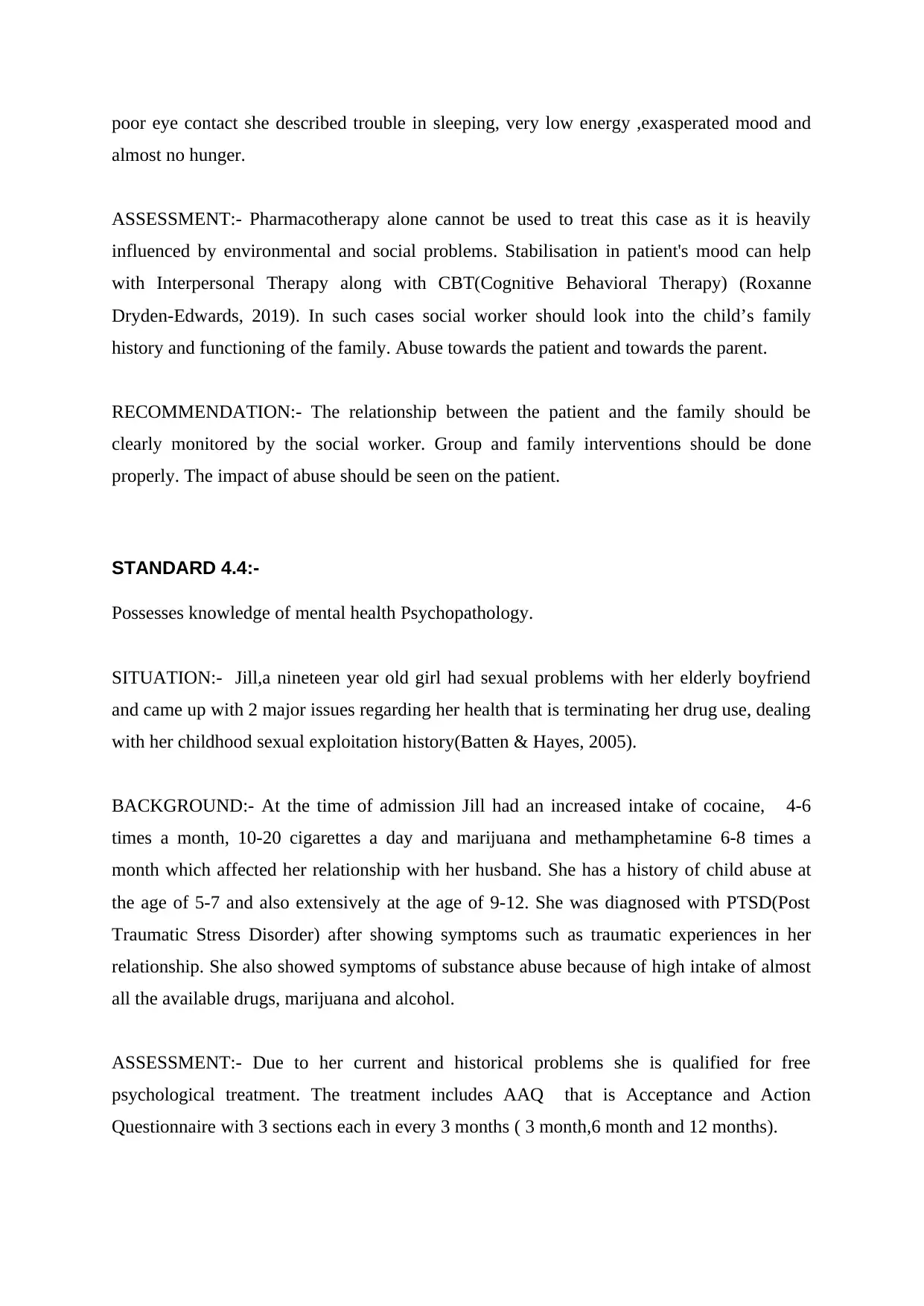
poor eye contact she described trouble in sleeping, very low energy ,exasperated mood and
almost no hunger.
ASSESSMENT:- Pharmacotherapy alone cannot be used to treat this case as it is heavily
influenced by environmental and social problems. Stabilisation in patient's mood can help
with Interpersonal Therapy along with CBT(Cognitive Behavioral Therapy) (Roxanne
Dryden-Edwards, 2019). In such cases social worker should look into the child’s family
history and functioning of the family. Abuse towards the patient and towards the parent.
RECOMMENDATION:- The relationship between the patient and the family should be
clearly monitored by the social worker. Group and family interventions should be done
properly. The impact of abuse should be seen on the patient.
STANDARD 4.4:-
Possesses knowledge of mental health Psychopathology.
SITUATION:- Jill,a nineteen year old girl had sexual problems with her elderly boyfriend
and came up with 2 major issues regarding her health that is terminating her drug use, dealing
with her childhood sexual exploitation history(Batten & Hayes, 2005).
BACKGROUND:- At the time of admission Jill had an increased intake of cocaine, 4-6
times a month, 10-20 cigarettes a day and marijuana and methamphetamine 6-8 times a
month which affected her relationship with her husband. She has a history of child abuse at
the age of 5-7 and also extensively at the age of 9-12. She was diagnosed with PTSD(Post
Traumatic Stress Disorder) after showing symptoms such as traumatic experiences in her
relationship. She also showed symptoms of substance abuse because of high intake of almost
all the available drugs, marijuana and alcohol.
ASSESSMENT:- Due to her current and historical problems she is qualified for free
psychological treatment. The treatment includes AAQ that is Acceptance and Action
Questionnaire with 3 sections each in every 3 months ( 3 month,6 month and 12 months).
almost no hunger.
ASSESSMENT:- Pharmacotherapy alone cannot be used to treat this case as it is heavily
influenced by environmental and social problems. Stabilisation in patient's mood can help
with Interpersonal Therapy along with CBT(Cognitive Behavioral Therapy) (Roxanne
Dryden-Edwards, 2019). In such cases social worker should look into the child’s family
history and functioning of the family. Abuse towards the patient and towards the parent.
RECOMMENDATION:- The relationship between the patient and the family should be
clearly monitored by the social worker. Group and family interventions should be done
properly. The impact of abuse should be seen on the patient.
STANDARD 4.4:-
Possesses knowledge of mental health Psychopathology.
SITUATION:- Jill,a nineteen year old girl had sexual problems with her elderly boyfriend
and came up with 2 major issues regarding her health that is terminating her drug use, dealing
with her childhood sexual exploitation history(Batten & Hayes, 2005).
BACKGROUND:- At the time of admission Jill had an increased intake of cocaine, 4-6
times a month, 10-20 cigarettes a day and marijuana and methamphetamine 6-8 times a
month which affected her relationship with her husband. She has a history of child abuse at
the age of 5-7 and also extensively at the age of 9-12. She was diagnosed with PTSD(Post
Traumatic Stress Disorder) after showing symptoms such as traumatic experiences in her
relationship. She also showed symptoms of substance abuse because of high intake of almost
all the available drugs, marijuana and alcohol.
ASSESSMENT:- Due to her current and historical problems she is qualified for free
psychological treatment. The treatment includes AAQ that is Acceptance and Action
Questionnaire with 3 sections each in every 3 months ( 3 month,6 month and 12 months).
Paraphrase This Document
Need a fresh take? Get an instant paraphrase of this document with our AI Paraphraser
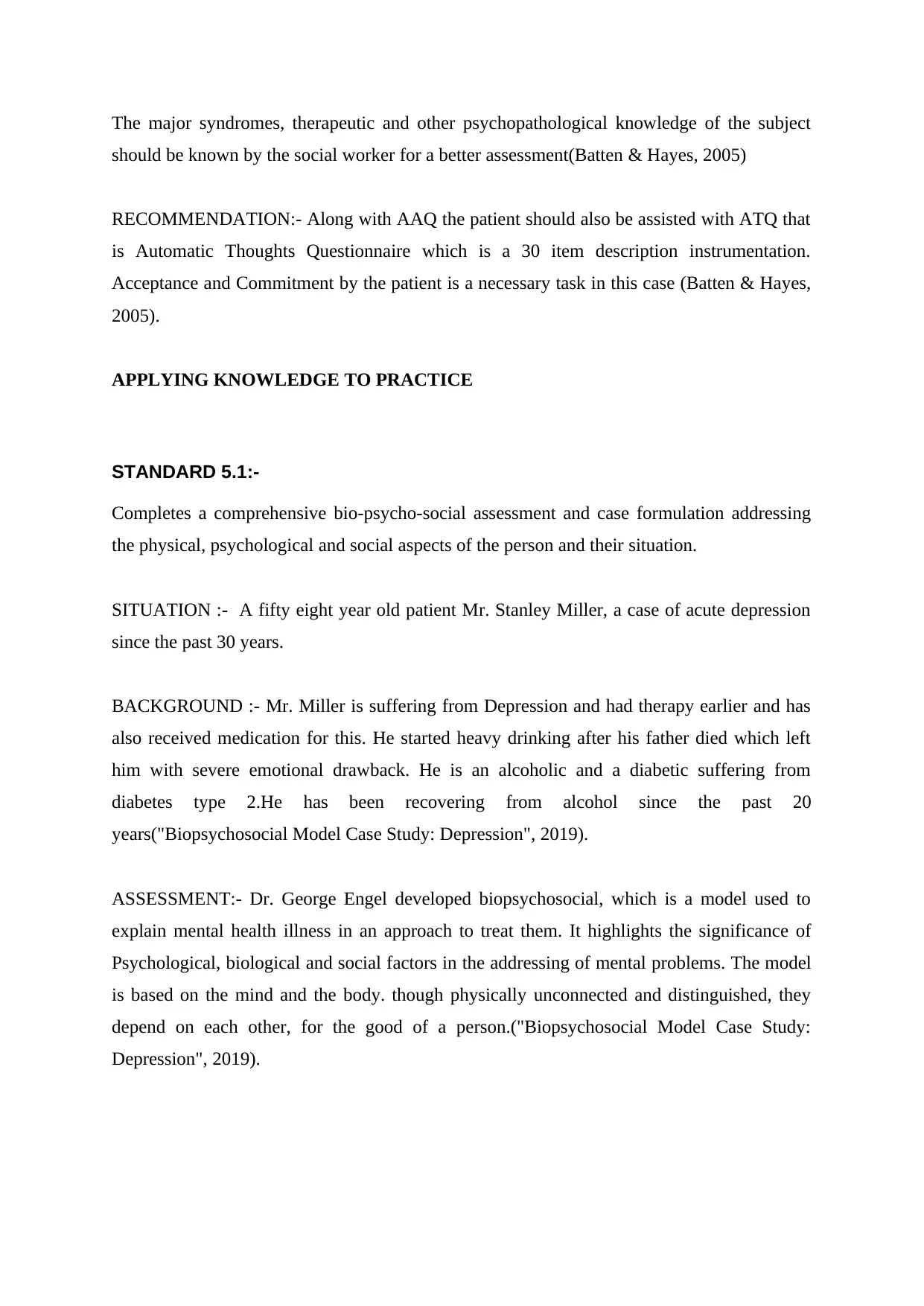
The major syndromes, therapeutic and other psychopathological knowledge of the subject
should be known by the social worker for a better assessment(Batten & Hayes, 2005)
RECOMMENDATION:- Along with AAQ the patient should also be assisted with ATQ that
is Automatic Thoughts Questionnaire which is a 30 item description instrumentation.
Acceptance and Commitment by the patient is a necessary task in this case (Batten & Hayes,
2005).
APPLYING KNOWLEDGE TO PRACTICE
STANDARD 5.1:-
Completes a comprehensive bio-psycho-social assessment and case formulation addressing
the physical, psychological and social aspects of the person and their situation.
SITUATION :- A fifty eight year old patient Mr. Stanley Miller, a case of acute depression
since the past 30 years.
BACKGROUND :- Mr. Miller is suffering from Depression and had therapy earlier and has
also received medication for this. He started heavy drinking after his father died which left
him with severe emotional drawback. He is an alcoholic and a diabetic suffering from
diabetes type 2.He has been recovering from alcohol since the past 20
years("Biopsychosocial Model Case Study: Depression", 2019).
ASSESSMENT:- Dr. George Engel developed biopsychosocial, which is a model used to
explain mental health illness in an approach to treat them. It highlights the significance of
Psychological, biological and social factors in the addressing of mental problems. The model
is based on the mind and the body. though physically unconnected and distinguished, they
depend on each other, for the good of a person.("Biopsychosocial Model Case Study:
Depression", 2019).
should be known by the social worker for a better assessment(Batten & Hayes, 2005)
RECOMMENDATION:- Along with AAQ the patient should also be assisted with ATQ that
is Automatic Thoughts Questionnaire which is a 30 item description instrumentation.
Acceptance and Commitment by the patient is a necessary task in this case (Batten & Hayes,
2005).
APPLYING KNOWLEDGE TO PRACTICE
STANDARD 5.1:-
Completes a comprehensive bio-psycho-social assessment and case formulation addressing
the physical, psychological and social aspects of the person and their situation.
SITUATION :- A fifty eight year old patient Mr. Stanley Miller, a case of acute depression
since the past 30 years.
BACKGROUND :- Mr. Miller is suffering from Depression and had therapy earlier and has
also received medication for this. He started heavy drinking after his father died which left
him with severe emotional drawback. He is an alcoholic and a diabetic suffering from
diabetes type 2.He has been recovering from alcohol since the past 20
years("Biopsychosocial Model Case Study: Depression", 2019).
ASSESSMENT:- Dr. George Engel developed biopsychosocial, which is a model used to
explain mental health illness in an approach to treat them. It highlights the significance of
Psychological, biological and social factors in the addressing of mental problems. The model
is based on the mind and the body. though physically unconnected and distinguished, they
depend on each other, for the good of a person.("Biopsychosocial Model Case Study:
Depression", 2019).
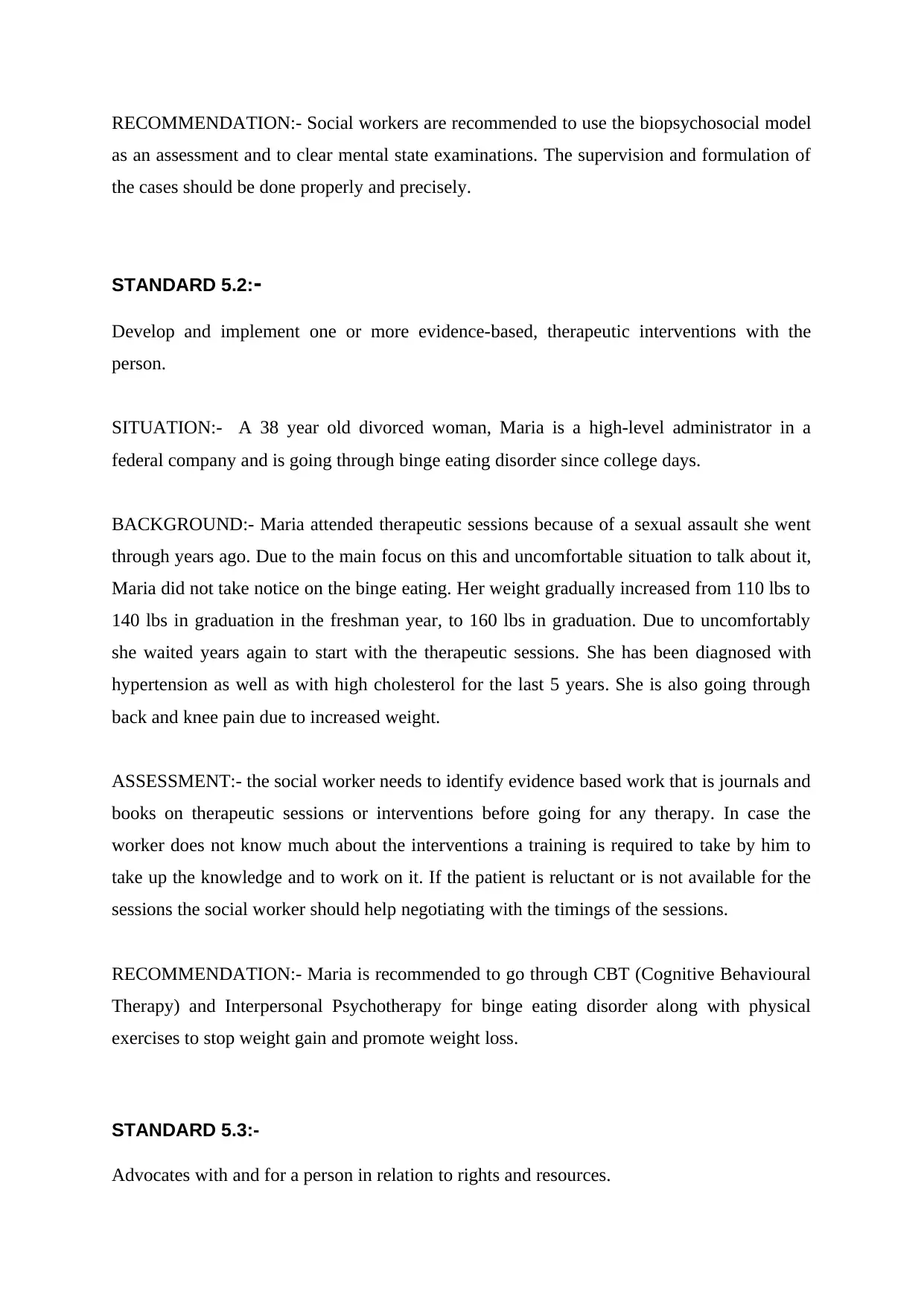
RECOMMENDATION:- Social workers are recommended to use the biopsychosocial model
as an assessment and to clear mental state examinations. The supervision and formulation of
the cases should be done properly and precisely.
STANDARD 5.2:-
Develop and implement one or more evidence-based, therapeutic interventions with the
person.
SITUATION:- A 38 year old divorced woman, Maria is a high-level administrator in a
federal company and is going through binge eating disorder since college days.
BACKGROUND:- Maria attended therapeutic sessions because of a sexual assault she went
through years ago. Due to the main focus on this and uncomfortable situation to talk about it,
Maria did not take notice on the binge eating. Her weight gradually increased from 110 lbs to
140 lbs in graduation in the freshman year, to 160 lbs in graduation. Due to uncomfortably
she waited years again to start with the therapeutic sessions. She has been diagnosed with
hypertension as well as with high cholesterol for the last 5 years. She is also going through
back and knee pain due to increased weight.
ASSESSMENT:- the social worker needs to identify evidence based work that is journals and
books on therapeutic sessions or interventions before going for any therapy. In case the
worker does not know much about the interventions a training is required to take by him to
take up the knowledge and to work on it. If the patient is reluctant or is not available for the
sessions the social worker should help negotiating with the timings of the sessions.
RECOMMENDATION:- Maria is recommended to go through CBT (Cognitive Behavioural
Therapy) and Interpersonal Psychotherapy for binge eating disorder along with physical
exercises to stop weight gain and promote weight loss.
STANDARD 5.3:-
Advocates with and for a person in relation to rights and resources.
as an assessment and to clear mental state examinations. The supervision and formulation of
the cases should be done properly and precisely.
STANDARD 5.2:-
Develop and implement one or more evidence-based, therapeutic interventions with the
person.
SITUATION:- A 38 year old divorced woman, Maria is a high-level administrator in a
federal company and is going through binge eating disorder since college days.
BACKGROUND:- Maria attended therapeutic sessions because of a sexual assault she went
through years ago. Due to the main focus on this and uncomfortable situation to talk about it,
Maria did not take notice on the binge eating. Her weight gradually increased from 110 lbs to
140 lbs in graduation in the freshman year, to 160 lbs in graduation. Due to uncomfortably
she waited years again to start with the therapeutic sessions. She has been diagnosed with
hypertension as well as with high cholesterol for the last 5 years. She is also going through
back and knee pain due to increased weight.
ASSESSMENT:- the social worker needs to identify evidence based work that is journals and
books on therapeutic sessions or interventions before going for any therapy. In case the
worker does not know much about the interventions a training is required to take by him to
take up the knowledge and to work on it. If the patient is reluctant or is not available for the
sessions the social worker should help negotiating with the timings of the sessions.
RECOMMENDATION:- Maria is recommended to go through CBT (Cognitive Behavioural
Therapy) and Interpersonal Psychotherapy for binge eating disorder along with physical
exercises to stop weight gain and promote weight loss.
STANDARD 5.3:-
Advocates with and for a person in relation to rights and resources.
⊘ This is a preview!⊘
Do you want full access?
Subscribe today to unlock all pages.

Trusted by 1+ million students worldwide
1 out of 20
Related Documents
Your All-in-One AI-Powered Toolkit for Academic Success.
+13062052269
info@desklib.com
Available 24*7 on WhatsApp / Email
![[object Object]](/_next/static/media/star-bottom.7253800d.svg)
Unlock your academic potential
Copyright © 2020–2026 A2Z Services. All Rights Reserved. Developed and managed by ZUCOL.




